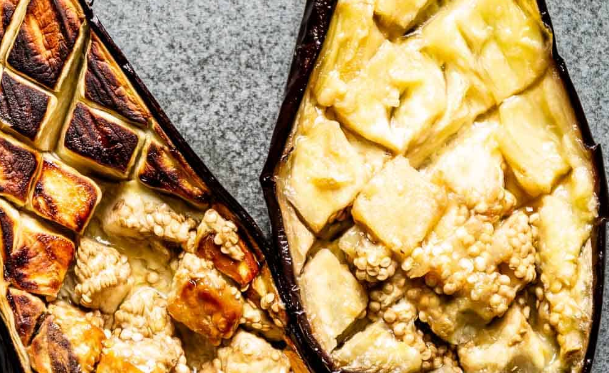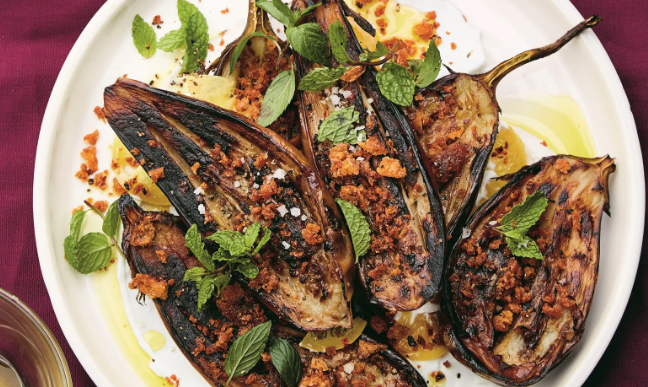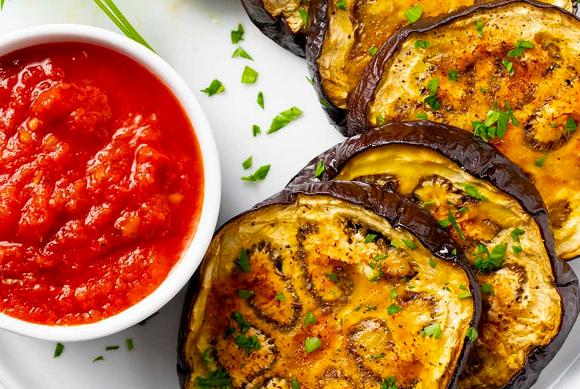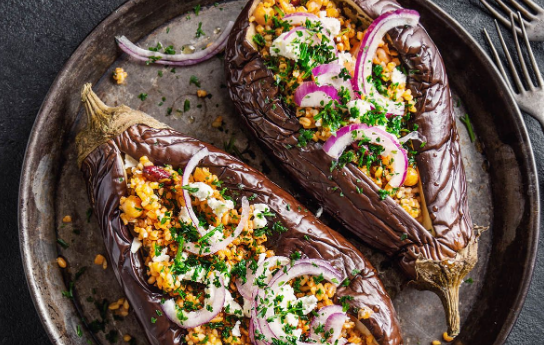How to Roast Whole Eggplant in Oven
It’s so easy to roast an entire eggplant in the oven. This versatile vegetable can be enjoyed on its own, in dips, or as the base for so many other recipes, from eggplant parmesan to baba ganoush and more. This is everything you need to know to roast a whole eggplant perfectly, including choosing the best eggplant, storing it, and using it in a wide variety of dishes.
Why Roast Whole Eggplant?
Eggplant roasted whole: a smoky, concentrated flavor paired with a creamy and tender interior. Cooking a whole eggplant steams the flesh inside its own skin to create a more tender and richer texture as compared with other cooking. It’s also a totally hands-off process, very convenient for busy nights and meal prep.
Ingredients for Oven-Roasting Eggplant
One of the best things about roasting eggplant is that it only requires a few ingredients:
- 1 whole eggplant (medium to large)
- 1-2 tablespoons olive oil
- Salt (optional, for seasoning after roasting)
That’s it! You can add additional seasonings or toppings later, depending on how you want to use the eggplant.
How to Roast Whole Eggplant
Step 1: Preheat the Oven
Preheat your oven to 400°F (200°C). Roasting at a high temperature helps to achieve that tender, creamy interior while giving the skin a slightly charred, smoky flavor.
Step 2: Prepare the Eggplant
1. Wash and Dry: Begin by washing the eggplant to remove any dirt or debris.
2. Pierce with a Fork: Piercing the eggplant using a fork at different places will ensure that the steam gets out when cooked so that the eggplant does not explode in the oven.
3. Brush with Olive Oil: Brush the olive oil gently on the skin of the eggplant to get it browned and not stick when baking. It will give a bit of flavor too to the edible skin.
Step 3: Put in Oven
1. Preparation of Baking Sheet: This may seem obvious, but making use of a baking sheet always requires lining it with some type of parchment paper or foil so that cleanup is smoother and easier.
2. Eggplant on the Baking Sheet: Place the eggplant straight onto the prepared baking sheet; there is no reason to cover it since it’ll be fine cooking out right into the open.
Step 4: Roast the Eggplant
Prerip the oven with this temperature and roast for about 35-45 minutes. It also will vary depending on your size eggplant:
- For medium-sized, roasting can be done in about 35-40 minutes.
- Larger will be taken about 40-50 minutes.
When using a fork, and stabbing into the flesh inside about 35 minutes check is done. It slides with ease, if this way, then eggplant’s done. Its peeling will be wrinkly as well as having smoldering marks; whereas inner part will be very soft and tender.
Step 5: Cool and Peel
1. Take the eggplant out of the oven. Wait for the roasted eggplant to rest a few minutes before working on it.
2. Peel the Skin (optional): To make it more delicate in texture or to serve as a dip, skin the eggplant by making a slit down the sides and scooping out the flesh with a spoon; leave the skin intact to use in most other dishes.
Baba ganoush is this super creamy, smoky dip made out of roasted eggplant, tahini, garlic, lemon juice, and olive oil. Just blend or mash it as you prefer for consistency. It’s a perfect accompaniment for pita bread or a great veggie dip.

Ways to Use Oven-Roasted Eggplant
Once you have a perfectly roasted eggplant, there are endless ways to use it. Here are some ideas:
1. Baba Ganoush
Baba ganoush is a creamy, smoky dip made with roasted eggplant, tahini, garlic, lemon juice, and olive oil. Simply blend or mash the ingredients to your desired consistency. It’s perfect as a dip with pita bread or veggies!
2. Eggplant Parmesan
Use your roasted eggplant for a lower-oil eggplant parmesan, layering the eggplant with marinara sauce, mozzarella, and Parmesan before baking until bubbly for that classic Italian comfort dish.
3. Stuffed Eggplant Boats
Once the eggplant is roasted, remove some flesh, mix it with your favorite filling, which may include ground meat, rice, and spices, and fill it back into the skin. Bake for another 15-20 minutes to have a delicious stuffed eggplant.
4. Roasted Eggplant Pasta
Chop or mash the roasted eggplant and mix it in with cooked pasta, garlic, fresh herbs, and olive oil for a ridiculously easy and delicious meal. You can add tomatoes or feta cheese for additional pizzazz.
5. Eggplant Salad
Toss the chunks of roasted eggplant with tomatoes, cucumbers, red onions, and fresh herbs of parsley and mint. Finally, drizzle everything with olive oil and squeeze over lemon juice for this very Mediterranean salad.

Tips for Properly Roasted Eggplant
1. Choose the Ideal Eggplant
Select an eggplant that has shiny, smooth, blemish-free skin. Its skin should be firm, tight, with a slight indentation to it when pressed down gently on the top. The small eggplants are less bitter and seedier than the larger ones and roast exceptionally well.
2. Punch the Skin
Roast the eggplant always pre-pierced to release steam. This will prevent bursting of the eggplant during roasting and will let the eggplant cook evenly.
3. Don’t Overcook
While it is important that you cook the eggplant tender, avoid over-roasting the eggplant. Over-roasting will make the flesh mushy. Check at 35 minutes and proceed with additional time if required.
4. Season After Roasting
Salt will absorb moisture, and the eggplant becomes too soft if added prior to roasting. You simply season your roasted eggplant with salt and other herbs or spices after it has been well cooked.
5. Eggplant Salad
Toss roasted eggplant chunks with tomatoes, cucumbers, red onions, and fresh herbs like parsley and mint. For a salad with a Mediterranean flair, drizzle with lemon juice and olive oil.
Health Benefits of Roasted Eggplant
- Almost Zero Calories: Eggplant is a great choice for those watching their calories as they are low in calories and high in fiber.
- Rich in Antioxidants: The purple skin in eggplants contains anthocyanins, which are strong antioxidants which can reduce inflammation and ensure the protection of cells.
- Fiber content in eggplants encourages healthy digestion and thus controls the level of glucose in the blood.
Richest in Vitamins - Eggplants are quite a good source of C, K, and B6 vitamins and minerals which include potassium and manganese.
If you are going to have leftovers, learn how to store and reheat roasted eggplant.
1. Refrigerator Storage
Store the airtight container in your refrigerator after allowing the eggplant to cool completely.
2. Freezer Storage
Transfer the roasted flesh of the eggplant in a freezer-safe bag or container and store it for up to 3 months. Thaw the same in your refrigerator before using.
3. Reheat
Reheat in oven at 350 degrees for 10-12 minutes or microwave until warmed medium-heat throughout, 1 – 2 minutes.
Conclusion
One of the most simplified methods of roasting, letting the vegetable reveal its dark, smoky flavors, as well as the velvety texture it displays. Little preparation and flavoring go a long way with this versatile ingredient ranging from simple dips, for instance, baba ganoush to lavish salads or pasta dishes. More roasting with eggplants in the kitchen equates to more flavors and higher nutrition for every meal served!


